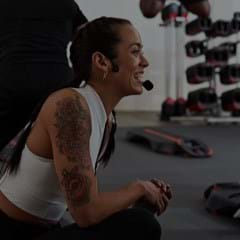Around fifteen years ago I had an extremely scary experience that made me realise group fitness was causing a problem in my life that I hadn’t realised was apparent. This problem was something I needed to get on top of straight away.
I was driving home after a weekend away. My partner was in the passenger seat on her phone and my daughter and her best friend were in the back seat playing. Around 90 minutes into the six-hour drive I fell asleep at the wheel.
The car jerked over the road which gave the girls a fright and I was shocked awake by their screaming. In this overwhelming moment I turned the wheel in the opposite direction which steered the car onto the other side of the road, so we were now in the lane of oncoming traffic. We ended up going into a fence.
Thankfully there were no cars coming towards us, so while there were thousands of dollars worth of damage to the car there was no harm to any of us, except shock.
After this experience I reflected a lot about how lucky we were and how the outcome could have been so much worse, and one of the biggest things I realised was that I was living in a constant state of fatigue. When I took a step back and looked at how I was living my life it was obvious why I was so tired – I had a full time job, I was a parent and I was teaching a lot of fitness classes each week. My energy output was huge but because I loved what I did, it was disguised in a blanket of passion. In this moment I knew I had to start looking after myself a bit better and use tools to help me do this.
The thing is, I know I’m not alone in feeling like this; there are so many people in our industry who are in the same place – we love what we do and often fatigue isn’t recognised. Our passion for our teaching can put us in denial when we get tired. When you think of the energy required to teach classes, it’s huge! There’s the obvious physical fitness requirements, but there’s also the emotional energy, the preparation time and the internal pressure we put on ourselves. That is a lot of energy output.
What my car crash taught me was that, while I loved what I was doing, I needed to acknowledge it came at a cost that I needed to manage in a better way.
For all of us, this acknowledgement is important, but what is more important is knowing what tools we can use to manage our fatigue.
There are the obvious things: creating a good sleep routine, eating enough for your energy output and choosing the right nutrition, including body care work to help physical recovery… and while these things are important, I’ve discovered other tools that have helped me manage my recovery and reduce my fatigue. These are:
- Setting boundaries: I’ve learned to know my limits with my energy output, so nowadays I know when to say no. Many of us take more and more on, which leads us towards that place of fatigue. Knowing your boundaries and guarding them, and knowing when to say no, are so important for self-care.
- Meditation or a midday recharge: I have a 20-minute lunch time meditation habit that is so important for my self-care. There’s the deeper benefits of meditation but this recharge has a massive impact on my energy levels for the second half of my day.
- Time for things outside of fitness: This can be social time, a hobby that has nothing to do with fitness, or just going to the movies. We fitness professionals can become a bit one-dimensional, so having other things in our lives can give us a good recharge and a “timeout” from the often consuming world of fitness.
- Having a day off: I’ve found that having one complete day off from exercise/teaching every week is so important for me. It’s my ultimate recharge and I have it in a guilt-free way, where I can embrace it and soak up what a relaxed day has to offer.
While I have offered some ideas here, it’s up to you to learn what works best for you. It may be a bit of a trial and error process but in the long term you should aim to develop a set of self-care tools that allow you to manage your energy in a healthy way.
We all love this thing we do but there can be a cost. If we can learn to manage this wisely not only will we avoid unhealthy fatigue, we’ll teach better classes and prolong the length of our career – a career we want to last as long as possible.
BEVAN JAMES EYLES is from Christchurch, NZ, where he still lives. He began teaching in 1999, and has raced in eight Ironman competitions as well as marathons. Listen to Bevan’s podcast.







